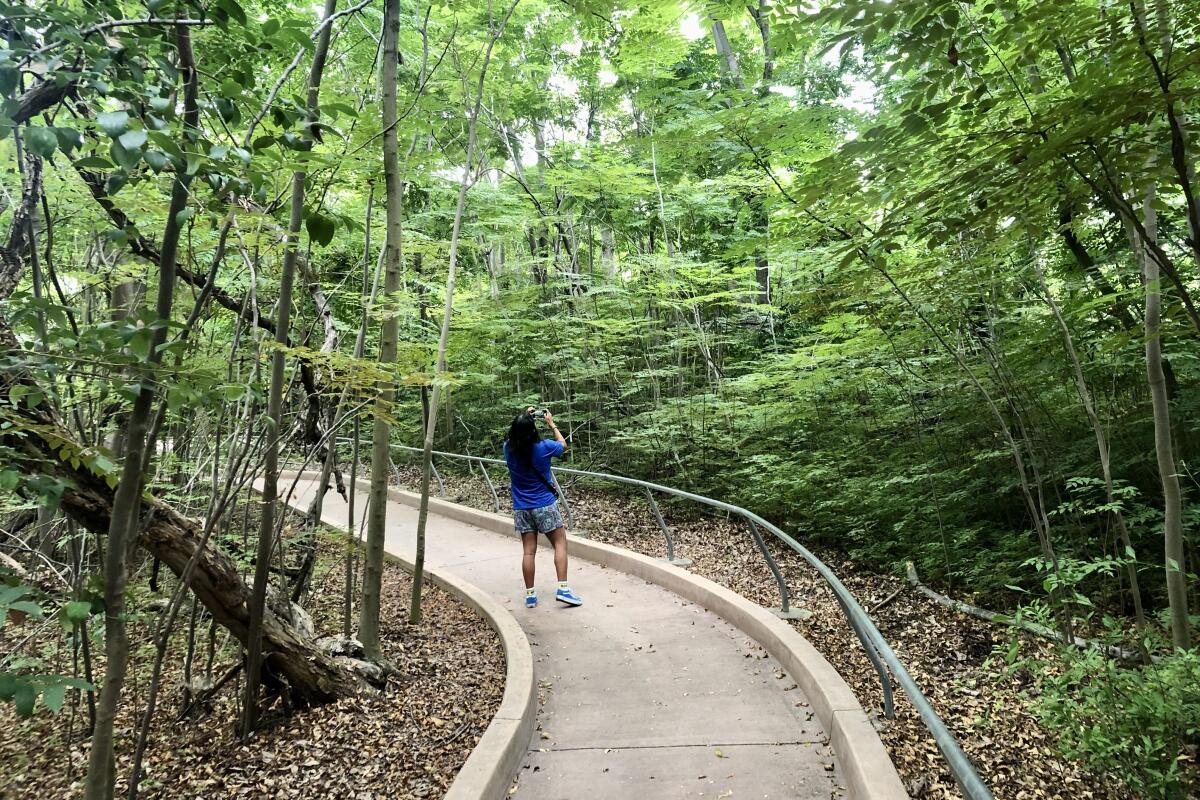72 awesome things to do with kids in L.A. before they grow up
Even in a place like Los Angeles, which is chock-full of activities, history and everyday wonders, parents and other guardians of children are still struck with anxiety when they hear the words: “What are we dooooing todaaaaay?”
(The question is usually asked in a tone that says, “And do not tell me we’re going to the same playground we’ve already been to six times this week.”)
We get it. Ideas can run dry, especially for busy moms, dads and caregivers. But L.A. is brimming with engaging and totally fun family-friendly spaces — and exploring them all through the bright eyes of a kid can help you fall in love with the city in entirely new ways.
Planning your weekend?
Stay up to date on the best things to do, see and eat in L.A.
In this guide, we share 72 things to do with children in and around Los Angeles — memorable activities to fit every age, interest, energy level and attention span (and for grownups, every budget). Your youngster can scale a make-believe skyscraper at a rock-climbing gym, construct a sculpture out of wood scraps at a maker space, watch a sea lion belly-slide at a marine mammal rescue center — all within SoCal borders.
All of the experiences here have been road-tested by Times writers and contributors, many with kids of our own. The list is primarily geared for the 13-and-under set, but older teens and other childlike souls would enjoy quite a few of the activities as well. We’ve skipped some of the obvious destinations, such as theme parks, most neighborhood parks and farmers markets (though we have highly specific guides for those too).
The days are long but childhood is short, so make some core memories around town. Your kids will come home happy, more connected to the city and — fingers crossed — ready for a nap. It’s a win all around. — Michelle Woo, West Coast experiences editor

Jump into a lake of slime at Sloomoo Institute Los Angeles
And you can make your own slime, which was a highlight for me and my 11-year-old daughter. The process requires quite a bit of tough decisionmaking. What texture would you like? Butter? Clear? Cloud creme? Jelly? Icee? And what scent do you prefer? There’s a wall of different sample smells, from gummy bears to fresh-baked bread to dirt. Finally, you have to choose your color and mix-ins (tiny toys to mix into your slime). For parents, perhaps the best part of Sloomoo Institute is that you get to leave the mess there. All of it. After getting a few specks of slime in her hair, my daughter took a trip to the makeshift Sloomoo Salon, where a friendly staff member got it out with slime-resistant vinegar.

Watch puppets dance at eye level at the Bob Baker Marionette Theater
Bob Baker founded the theater in 1963 with partner Alton Wood, created thousands of marionettes and ran the outfit for decades in a rustic cinderblock-walled space near the edge of downtown Los Angeles. Legions of pint-sized Angelenos passed through, many of whom are now grandparents.
Since Baker’s death in 2014 at age 90, the troupe has moved to a splendid (and very red) space on York Avenue at the border of Highland Park and Eagle Rock.
The venue holds fewer than 100 people, and most kids sit “criss-cross applesauce” style on the carpet in front. Weekend shows (usually three on Saturdays) typically begin with jaunty organ intro music by Mr. Ed Torres, followed by about an hourlong presentation that features 100 or more marionettes, which waltz madly, sing operatically, bat eyelashes and operate right at a kid’s eye level. At the end of most shows (don’t tell the kids), there’s surprise ice cream.
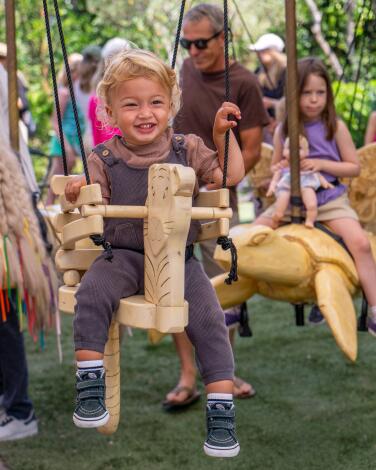
Get a magical, people-powered history lesson at the Venice Flying Carousel
Murez’s kinetic history lesson, which eventually will have a permanent home in Venice’s Centennial Park (she’s gathering petition signatures to speed up the stalled process), delights approximately 30 kids (120 pounds max) each hourlong session. They’re buckled onto Orson the duck, Joelle L’Escargot (a crown-wearing snail), Ribbon the unicorn or one of their carved companions for a brief ride propelled by the artist (or a helper), who stands in the center energetically cranking what looks like a ship’s wheel. “I’ve learned carousel etiquette,” Murez said about how long each ride lasts. “It goes on for the length of one song, so that’s about two minutes. I play a lot of Frank Sinatra, I play Brazilian jazz. I take requests.” My request, no doubt shared by the local parents who bring their children two or three times a month to squeal with delight as they soar around the circle: Give the magical menagerie its forever home as soon as possible. In addition to the scheduled hour each weekend day, Murez’s magical carousel is open by appointment for special events like birthday parties.

Ride a train through a lovely oak grove at the Descanso Railroad
The model train area is modestly sized; a brisk walk around it with brief stops to admire the tiny train stations would take only a couple of minutes. But with a lingering toddler, you could be here for hours. The walkways are wide enough to accommodate ample stroller traffic, and the low fences let kids get a full view.
The train ride — a ⅛ scale model of a diesel engine — first arrived at Descanso Gardens as a seasonal attraction in the 1980s and became a permanent feature in 1996. It closed in 2023 for a renovation, including an upgrade to be completely electric. Riders take a 4 mph train trip looping under the oak trees that lasts six minutes. You straddle a low bench to ride, rendering it not entirely skirt-friendly.
There is also, naturally, an on-site gift shop in the shape of a train car.

Burst into giggles at a 'Pull My Finger' comedy show at the Crow
Except at this performance, the seats are mostly filled with audience members who rode to the club in car seats and whose drink of choice is chocolate milk. “Pull My Finger” is a G-rated comedy show that gets families giggling with highly interactive improv games in the style of “Whose Line Is It Anyway?” The in-house troupe, Happy Crow Lucky, acts out scenes prompted by words and scenarios blurted out by young members of the crowd (fair warning: The plot often ends up involving poop, farts and “skibidi”). Each show is packed with a hefty number of puns, which dads will appreciate, and chances for your little ones to be part of the skits onstage. When I attended, there was also a special performance by Those Klein Boys, two rapping brothers who revved up the audience with their made-up-on-the-spot lyrics inspired by the day’s show. (How they were effortlessly able to think of phrases that rhyme with “bakery in Hawaii” is a true gift.)
“Pull My Finger,” which I’d say is best for kids ages 4 to 12 and their families, happens every third Saturday of the month. The Crow also hosts “BYOB(aby/ottle/uggy),” a totally adult comedy show for parents of babies (who are too young to understand the jokes), and “IRL,” a show for teens.
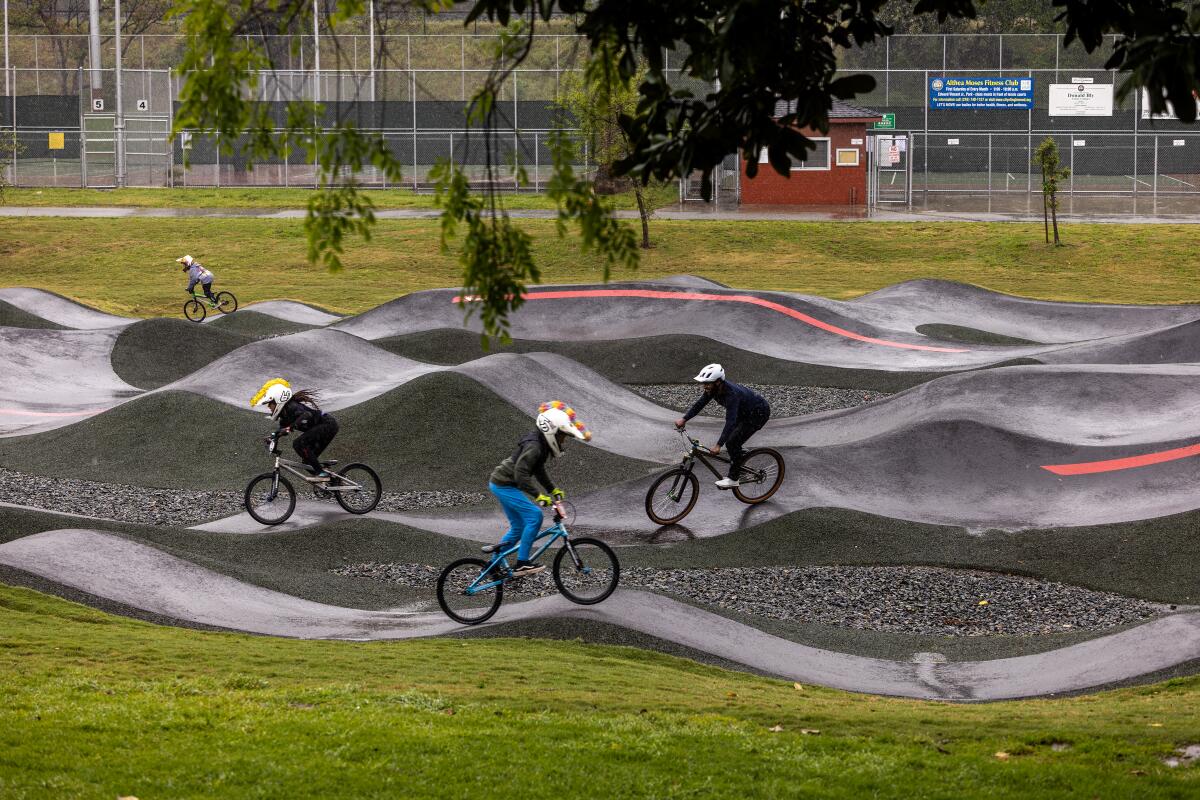
Zoom down the Inglewood Pumptrack, a 'Disneyland for bikes'
The site — launched by Grow Cycling Foundation and billed as L.A.’s first pump track — features two asphalt courses, the Woodlands and World Championship tracks. Woodlands, which is smaller and surrounds a host of trees, has smaller rollers and is designed for slower speeds, whereas the colossus World Championship track, which is wider with large rollers, was built in a mirrored design so two riders can race in opposite directions at the same time. Both tracks are open to all ages and levels.
Ameri de Vera, 9, who rides BMX on the Inglewood Pumptrack at least twice a month with her older sister, says, “I was scared at first because you have to get used to how it sways. It sways in different directions and there’s some sharp turns too. So you have to keep your eye on those, but it was really fun once I got used to it.”
Other wheels such as skateboards, longboards and rollerblades are welcome at the pump track on specific days of the week.
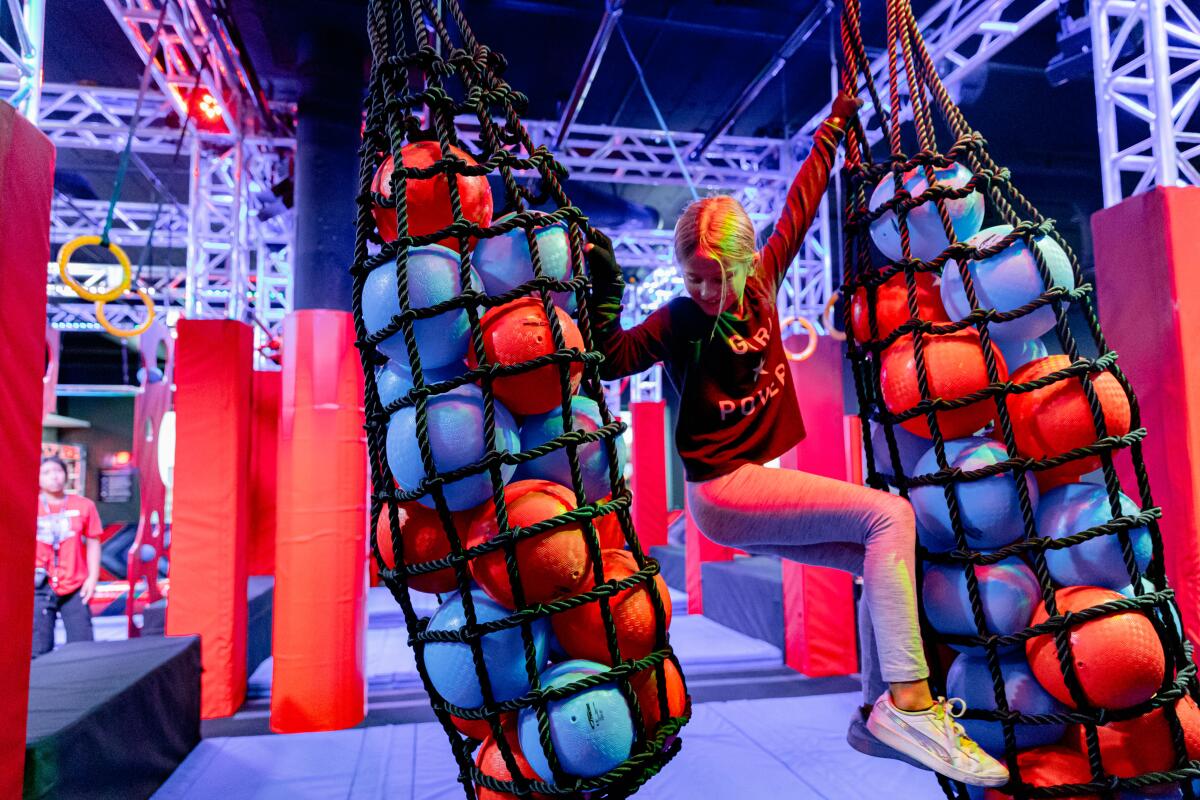
Swing, leap and face-plant at American Ninja Warrior Adventure Park
After checking in and stowing your stuff in a locker, put on your gloves and socks and start anywhere you like. You can crawl all over the inflatable course or take on any of its five more challenging tests. Try everything, in any order. The artists and engineers who built the park did an amazing job of re-creating the show’s aesthetic, using black ceilings and walls to create depth and an impressive lighting system that casts a red and blue glow over everything beneath it.
Just be warned: The park’s obstacle courses are hard. Each is about 20 yards long and starts with an unstable path to be traversed on foot. After that comes a smorgasbord of hanging by your hands, followed by tests of grit, critical thinking and dynamic balance. The spinning log in the middle of course No. 4 was my vicious adversary. ANWAP is supposed to be for all ages, but this 10-foot cylindrical section of it was not intended for 50-year-olds with janky lower backs.

Bounce away boredom at L.A.'s Funbox bounce park
Inside, you and your kids don grip socks (BYO or buy there) and bounce for up to 90 minutes across a massive landscape including a jousting station, obstacle course, ninja wall and 23-foot slide. Everything you moon-walk across is inflated, so there’s no reason to stop bouncing — don’t be surprised if, egged on by your kids, you log 30,000 steps during your trip. Kids under 13 need to be with an adult, but only kids 5 and under need an adult bouncing with them. The tickets are rather steep in comparison with other playspaces ($22 for ages 6 and over, $12 for ages 3 to 5, $59 for a family four-pack and toddlers up to 2 are free), but the tranquility in the car afterward should be worth it.
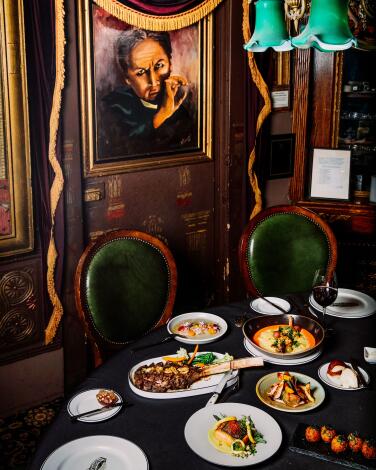
Get tricked at Sunday brunch at Magic Castle
Bonus tip: The Magic Castle Hotel is a converted 1950s apartment building, not nearly as fancy as the castle. Room rates start about $225 (and most units have kitchens). The furniture and grounds are worn, but we had alert service. And that red phone by the pool? That’s the free popsicle hotline.

Win your dream plushie in the claw machines at the Neofuns Arcade
Neofuns Arcade joins a crop of adorable claw machine arcades that have descended upon SoCal. Also check out the Clawcade in Torrance, Kawaii Klaws (multiple locations) and Claw Daddy Arcades in Montebello.

Scale skyscrapers at Sender City
The climbing features are both static and kinetic, with kinetic routes made of tires that sway while climbing, providing an additional challenge. Two kids can weave their way through the spiderweb-shaped climb together. The thrilling jump-catch tower has little ones leap to catch a climbing bag (while attached to a harness, of course), while they grab glow-in-the-dark holds in the Mineshaft. Whether it’s your kids’ first time climbing or they climb every week, they’ll find ample challenges — or they can later head into the rest of the gym for harder routes.
Climbers ages 10 and older can clip themselves into auto-belays (under 10 must be clipped by parents), meaning the rope automatically catches and lowers them without the use of a human belayer. Both climbing shoes and regular close-toed shoes are permitted, and climbers must wear helmets and harnesses (athletic clothing is recommended, and you’ll want to bring socks for the slide). Advance reservations and on-site waivers are required for all parents and kids, even those who don’t climb, and all climbers must weigh between 35 and 300 pounds. Arrive 15 to 30 minutes early so you have time to change and sign waivers and still participate in a full session. To find other kid-friendly climbing gyms to visit, check out our guide.
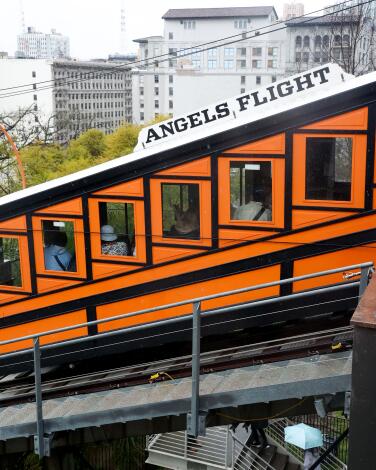
Ride the world's shortest railway for $1
The tiny funicular railway — it’s a charmer — is a must-do at least once. Tack it on, for instance, to a visit to Grand Central Market. One-way rides are $1 apiece and, at the time of publication, Metro Tap Card users get a discount. Fun fact: Its two cars, built in a Beaux-Arts architectural style, are named Sinai and Olivet.

Assemble a remote control car and let it race at Ridemakerz
Next, I had to affix the chassis to the base. I had chosen a sporty model. Standing around an oval-shaped workbench, I grabbed the drill hanging before me and my mini red Corvette became a reality. All told, it took me 90 seconds to construct a car. That time wasn’t bad, I was told, but I knew I had lost a good 30 seconds bungling with the wheels.
Ridemakerz aims to make the car crafting experience simple and efficient, creating a workbench set up designed to feel like a tiny pit stop. I kept things relatively basic, but the franchise boasts that it has more than 649 car combinations. There are, for instance, standard wheels, or flame-enhanced ones, not to mention dozens of rims, an assortment of grills and a host of light-up side pipes. A basic electric car starts at about $29.99, with remote control add-ons beginning at $25.
All told, I had a car zipping around the floor of the store in about 20 minutes. Now I just need someone to race with.
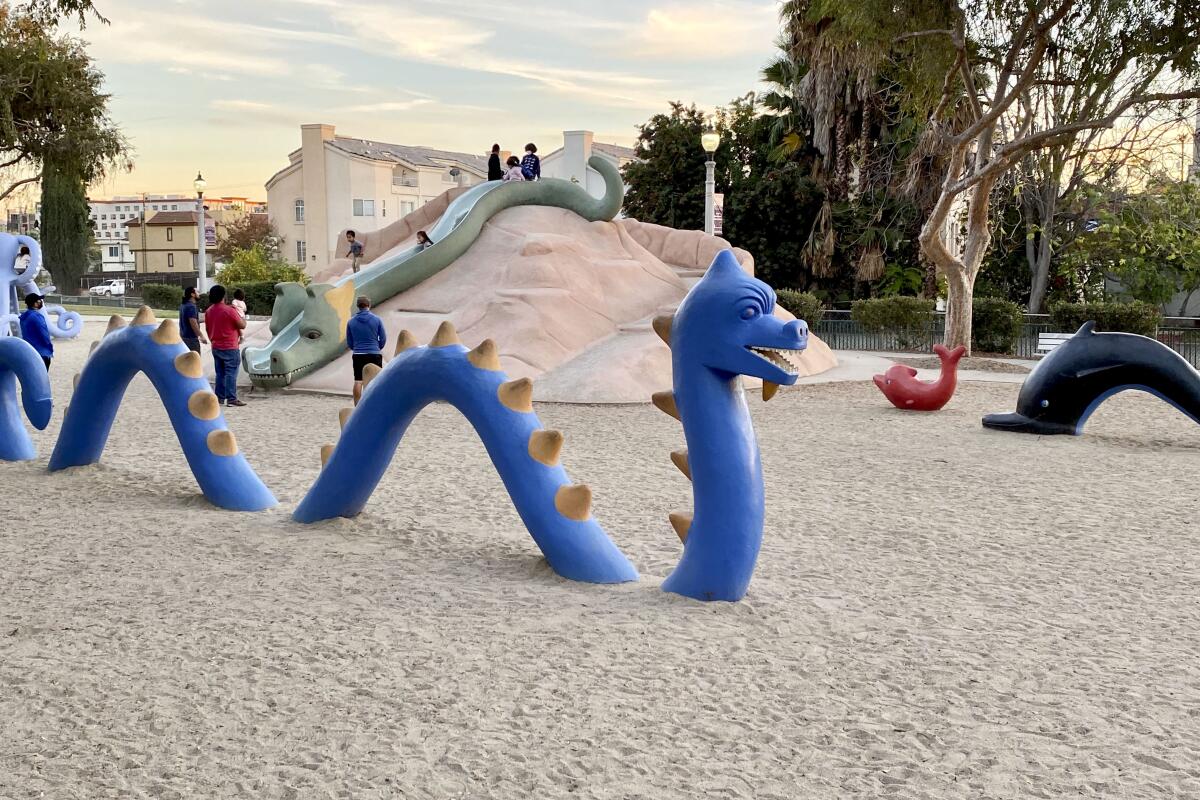
Enter a fantastical wonderland at La Laguna de San Gabriel
Opened in 1965, La Laguna was the final project in a career that took Dominguez from his native Mexico to El Paso to Las Vegas and finally to Los Angeles. In L.A., you can find his whimsical play sculptures at Whittier Narrows and the Atlantis Play Center in Garden Grove. But La Laguna was Dominguez’s masterpiece, an immersive environment where the creatures seem to exist in communion with one another.
Today, it’s also a great example of community preservation efforts in action. When it faced demolition in 2006, a group of locals formed Friends of La Laguna to save it. They raised some $700,000 to restore and preserve the playground, piece by piece.

Watch sea lions belly-slide at Marine Mammal Care Center
Sick, injured and abandoned seals and sea lions are regularly brought into the safe haven — you can find the current numbers on a whiteboard. One former patient, a sea lion named Sal, was found with a gill net wrapped around his neck. Another named Lynn was stranded after escaping an encounter with a shark. The animals are cared for by staff and volunteers, who administer medication, monitor the quality of the pool water and take progress notes. You can view the patients from a safe distance during a free visit, which you can schedule on the center’s website. While there, spend some time in the revamped visitor center, where your kids can learn more about ocean conservation with hands-on activities and perhaps pick up a fluffy seal pup stuffed animal on their way out.

Make a sushi platter or beach cottage out of candy at Candified
Let’s start with the art. Hanging on the walls are giant framed portraits of icons — all made of candy. The Taylor Swift masterpiece uses 35,000 pieces and contains (gasp) 23,000 grams of sugar. Works depicting Lizzo, Harry Styles and “The Dance” by Keith Haring are equally jaw-dropping (and tooth-aching). The creations stem from the artistry of Candified co-founder Jackie Sorkin, who was the mastermind of Candytopia, one of L.A.’s original Instagram-era pop-up museums. She’s been called a modern-day Willy Wonka.
Then there’s the crafty studio. Kids can choose a project to create out of — you guessed it — candy. My kids were fully engaged in making sushi bento boxes for about an hour. Next time they might try assembling a beach cottage or pretty geode cookies.
Finally, there’s the candy shop itself, which carries both individually wrapped items and scoopable bulk candy. You’ll leave Candified with a high, both from the sugar and the sweet experience.

Enter sticker heaven at Sticker Planet
And it’s hard to pull your kids away — or leave the shop empty-handed. During a recent visit, my son scored a sheet of Spider-Man stickers and my daughter chose a jeweled alien in a rainbow-emitting spaceship. If there’s something specific you’re looking for — say, a sticker of bleary-eyed Garfield wearing pajamas and bunny slippers — ask one of the friendly staff members and they can likely help you locate it.

Hear tales fit for queens at Drag Story Hour
Originally funded by West Hollywood’s Arts Division in 2017, this series at the West Hollywood branch of the L.A. County Public Library is produced by drag queen Pickle, who is also the city’s current Drag Laureate. While she has certain books that are her go-to titles, Pickle often rotates in topical tales based on the season. At the last Drag Story Hour that fell during Pride month, Pickle read books including “Rainbow Saurus,” “Cinderelliot” and “This Day in June.”
The event is free and held in the community room just off the front entrance of the West Hollywood Library. Drag Story Hour is held every other month on a Saturday. The next one happens on Dec. 7 at 11 a.m.

Take selfies with pop culture icons at the Funko toy store
Long lines used to stretch down the street when the store first opened in November 2019, but that frenzy has since died down (although I’m told there’s often a rush after a matinee performance at the Pantages Theatre down the street). I saw plenty of toddlers enjoying the store, but this is also a great pick for hard-to-please tweens and teens. Older kids might also enjoy a visit to the Shake Shack next door or Amoeba Music across the street.

Unveil your proudest Lego build at Bricks & Minifigs
It’s a Lego aftermarket shop with a handful of L.A. franchise locations, including the one I visited in Lomita. You can bring in your used Lego products to earn cash and, while there, pick up everything from loose bricks in bulk (take home whatever fits in a small bucket for $8) to rare retired sets (I spotted a 2017 Grand Admiral Thrawn minifigure selling for $200). At the Lomita store, owned by Miguel Zuniga, there’s a genuine family vibe — guests are invited to place their personal minifig (a customized Lego person) inside a Lego replica of the shop, showing that they’re part of the crew. And on the last Friday of every month, there’s BAMily Night, an event that welcomes Lego enthusiasts of any age to bring in a build they’re proud of and share it with others.
Sometimes, Zuniga will host meet-and-greets — recent guests have included Dan Hernandez and Benji Samit, the creators of “LEGO Star Wars: Rebuild the Galaxy,” and “Lego Masters” contestant Allyson Gail. You’ll always see kids in the space, whether they’re competing in a Lego building contest or searching for that very specific brick they lost last Christmas.

Learn how to use power tools at Rediscover Center
I brought my husband and 5-year-old son to a family crafting session at the Venice location one Sunday morning and it was 75 minutes of blissful flow. Along the walls were rows of containers of donated treasures — bits of fabric, old zippers, tiny plastic toys, broken jewelry, packing peanuts, marbles and bottle caps — that we were welcome to grab from and bring back to our work table. What we did with those items was up to us. “What would we make today?” we wondered. There were plenty of creations around the room to keep us inspired. Mobiles made of toilet paper tubes! A space helmet fashioned out of metallic materials! Cardboard animal masks! In the end, my husband and son assembled a birdhouse-rocket hybrid while I created a DIY sign for my son’s room. We were proud of it all.
Rediscover Center, which also has a Mid-City space, also offers open tinkering sessions for those over 8 — there, after completing a tool training workshop, you can work with wood and tools like hammers, saws, drills and sanders. There are sustainability-focused camps and community events too. And if you have stuff at home you’re about to throw out — anything from berry baskets to old golf balls — why not donate it instead? Your trash might just become a stranger’s next masterpiece.
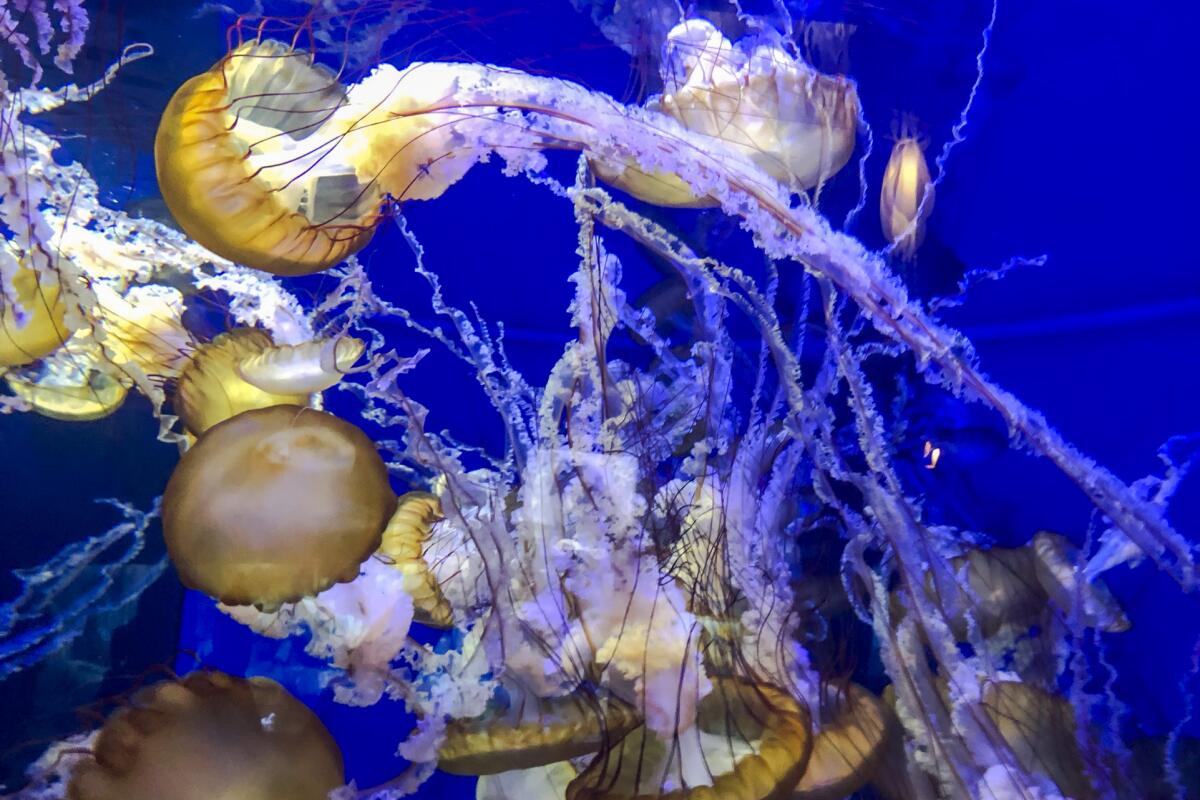
See creatures in the Aquarium of the Pacific
Although the aquarium is open every day of the year (except Christmas Day), it’s worth paying a visit on a weekend between 11:30 a.m. and 3:30 p.m. so you can pop by the Moon Jelly Touch Lab on the Harbor Terrace and hand-feed some of the Aurelia labiata yourself. Buy a condiment cup or two of brine shrimp (one for $3, two for $5; I highly recommend the latter), pour it into the water next to a jelly and watch tiny pink blobs appear inside its translucent bell, indicating its stomachs are filling with lunch. At this point, you should take the opportunity to reach out and lightly touch the moon jelly’s bell (you won’t get stung — its venom is too weak for humans to feel) so you can tell all your friends about that time you petted a jellyfish.
For a local perspective, check out the aquarium’s Southern California Gallery, which includes the California two-spot octopus, leopard and horn sharks, California scorpionfish, a moray eel, California spiny lobsters, Catalina goby and the state marine fish — the Garibaldi.
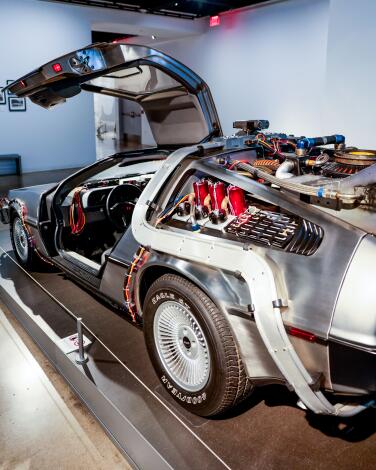
Behold the 1989 Batmobile (and other cool cars) at Petersen Automotive Museum
From the first functional car (which was built in 1886) to a life-size replica of Lightning McQueen from the Pixar movie “Cars,” the Petersen has plenty of flashy automobiles and factoids to marvel at.
Movie lovers can find the DeLorean from “Back to the Future,” Black Panther’s claw-marked Lexus, the 1989 Batmobile and Scooby-Doo’s Mystery Machine, among other car stars. The entire place feels a bit like a 3D encyclopedia, with perfectly organized collections of TV-famous vehicles and cars that belong to celebrities including Slash, Daniel Wu and Patrick Dempsey. Where else would you learn that athletes such as Muhammad Ali, Charles Barkley and Joe Namath inspired Lightning McQueen’s competitors in the “Cars” franchise?
For an additional charge, you can explore the Vault, where there are more than 200 automobiles, including race cars, lowriders and one-of-a-kind paint jobs. You can also sneak a peek at the 1998 Popemobile (designed for Pope John Paul II), the yellow van from “Little Miss Sunshine” (which was one of five used to film the movie) and a massive statue of the Michelin Man. On the first floor there’s the Meyers Manx Cafe, a perfect place to process all of your newfound car expertise and refuel with sandwiches and pizza.

Pick your own berries or sunflowers at Underwood Family Farms in Moorpark
The “pick your own” experience brings crowds of budding farmers to the farm — especially during strawberry season in the spring. You can check which crops are available for picking on any given week on the farm’s website.

Get schooled on probiotics (and meet a productive robot) on a free Yakult factory tour
On the free Yakult factory tour, you’ll watch a fun hologram presentation, interact with a huge touchscreen, learn about the history of the company and see how the drink is made, filled and sealed. And since all that activity may leave you parched, you’ll even get treated to a nice, cold bottle of Yakult.
Yakult was invented and developed in Japan by Dr. Minoru Shirota in 1935. It has since spread worldwide to more than 40 countrie,s and Sirota’s special strain — Lactobacillus casei strain Shirota — has been incorporated into many probiotic products and even skincare.
Inside the factory building in Fountain Valley, you’ll walk down a futuristic-looking hallway to see the entire production unfold: from the Seed Room, where the culturing of the probiotic strain takes place, to the Palletizing Room, where kids will be mesmerized by a robot methodically stacking the packaged Yakult bottles to prepare for shipment. Each room and the manufacturing stages are first explained in a short video — hosted by Mr. Yakult, the company’s kawaii mascot.
Recycling tip: Check with your local recycler, but Yakult bottles (and their foil lids) are known to bring in more money per pound than most other recyclable items.
Factory tours are open to those ages 5 and up, and are offered Monday through Friday (except holidays) at 10 a.m., 2 p.m. and 4 p.m. Reservations are required and can be made online here.

Become a worker inside a bustling construction zone at Dig It
Foam shapes beckon them — they can construct a fort, a castle or maybe a car — as do wooden wheels and blocks, where large, simple-to-affix tools stand at the ready to be turned into vehicles, towers or more. An earthquake table — push a button and it shakes — turns tremors into a joyful experience, as they can see if their mini creations can withstand a good wobble. For kids who want to practice some grown-up activities, Dig It has toy-like excavators, but for those who just want to be silly, there’s a giant hamster wheel and multiple slides.
And there’s more: Magnetic walls filled with knobs and malleable ramps beg to be touched, racing ramps await whatever you may build and a conveyor belt is going to require teamwork. “Play is really how children learn,” says Crystal McGinnis, Dig It’s general manager. She nods to a young girl escorting multiple balls through tunnels and ramps affixed to a wall. “She is learning about science. She’s learning about cause and effect. She’s learning about gravity.”
Dig It dedicates its weekday mornings to toddlers, 5 and younger. They have free run of the space from 10 a.m. to noon, at which time Dig It allows in kids of all ages. Children’s admission starts at $21, and that includes one adult. Additional adults are $8.
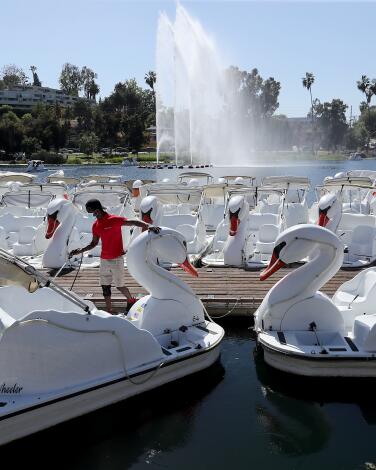
Paddle a swan boat in Echo Park Lake
The boats are managed by Wheel Fun Rentals. All ages are welcome to ride the Swan Pedal Boats (operators even have infant life jackets). Guests under age 15 must have a parent or guardian over 18 years old on board. The small boats can seat two adults and two children under age 10. The large boats can seat up to five people. Hand-crank pedal boats also are available.
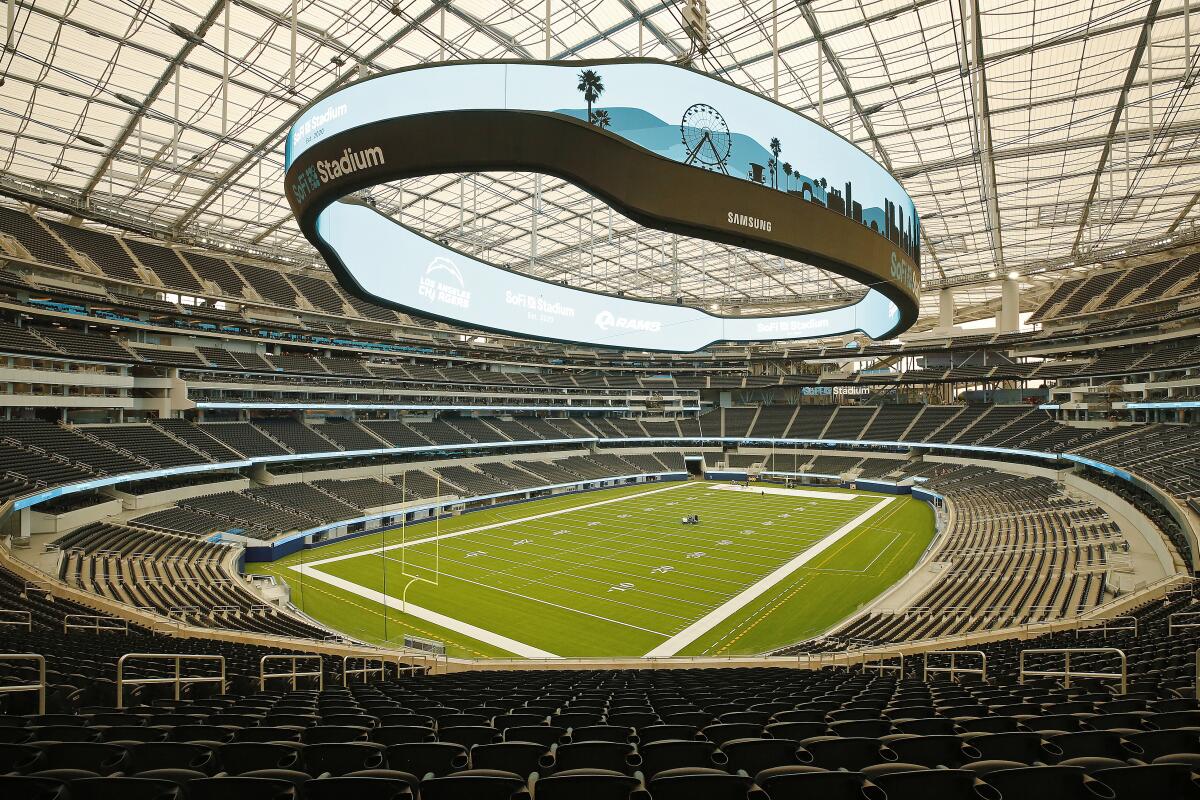
Kick a field goal on a tour of SoFi Stadium
Along the way, the tour guide drops some interesting bits of knowledge: The entire stadium is 100 feet underground. Magic Johnson always requests chicken fingers when he’s dining there. The enormous video screen contraption weighs 2.2 million pounds. And my favorite tidbit: The birds are kept away from the stadium by hawks that are wrangled by a bird handler named Tango, who lives on the premises. There are three price levels of tours — we opted for the midpriced version that offered the field experience as well as access to the beautifully curated Kinsey African American Art & History Collection, which was well worth the upsell.
Tours are offered daily and are priced at $45, $57 and $68 depending on the level of access. Dates and times vary depending on games and events taking place; check the schedule here for available times and to purchase tickets.

Go ’round and ’round on the Santa Monica Pier Carousel
The ride spins surprisingly fast, so hang on tight if you get dizzy easily. The horses on the outer ring of the carousel are stationary while the interior ones go up and down. If you or your little rider are apprehensive about hopping in the saddle, there are “chariot” benches to sit on.The carousel is indoors, but you can see the Pacific Ocean just outside the windows if you squint a little. Nearby is a gift shop and an old-fashioned ice cream sundae bar.
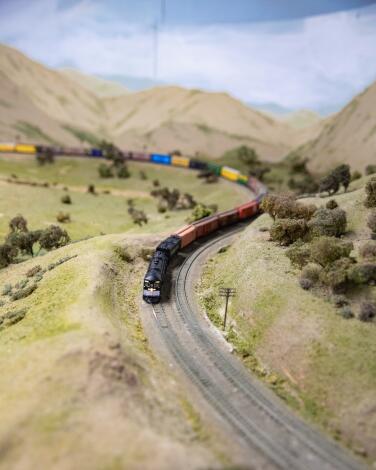
Enter the coolest miniature city at Belmont Shore Railroad Club
It’s amazing to see what the model railroaders have built here: an entire miniature city called Belmont. Though it is a fictional metropolis, it’s filled with re-creations of many real historical and geographic features of Southern California: the Monolith Cement Plant, San Joaquin and the green hills around the Tehachapi Loop. In the real world, a trip around the railroad line would be 20 miles.
The club, which accepts new members through an application process, opens its doors for public viewing from noon to 4 p.m. on Saturdays and 7 to 9 p.m. on Tuesdays. Just note that the track is at a viewing height suited for adults, so you’ll likely have to lift up your young train fan to get a good glimpse.

Bask in the neon glow of the Valley Relics Museum
So we’re fortunate to have the Valley Relics Museum with us. Housed in a double airplane hangar at the Van Nuys Airport, the museum displays the glowing remnants of San Fernando Valley restaurants and bowling alleys, liquor stores and paint shops, all cleaned up and plugged in. It has neon from long-gone local spots like the Palomino Club, once the West Coast’s premier outpost for country music, plus signage from businesses that’ll press the nostalgia buttons for Valley natives, such as Mel’s Drive-In and Bob’s Big Boy.
Beyond the gaseous tubes, the Valley Relics Museum possesses a treasure trove of pop culture ephemera, as filtered through an 818 lens. You’ll find displays devoted to Universal movie monsters, BMX bikes and vintage lunchboxes — something for any adult to connect with their inner kid. For the actual kids, there’s also a bank of vintage arcade games and pinball machines, all free to play. That’ll keep ’em occupied for a while. But the neon is what will keep you coming back.
Can’t get enough neon? Visit the Museum of Neon Art in Glendale — another worthy guardian of L.A.’s neon heritage.

Get cozy with the kitties at Crumbs & Whiskers Cat Cafe
At any given time the cafe has about 25 cats (who were at risk of euthanasia) roaming the space and ready to be adopted. Guests are encouraged to plop down on a pouf and get cozy with the kitties. But remember, they’re cats. So play it cool and let them come to you. In order to grab a coffee with a kitten you’ll need to make a reservation. Weekday rates run $25 for a 30-minute session and $40 for 70 minutes. Children must be at least 7 years old to enter, and those under 12 need to be accompanied by an adult.

Join a rolling, pedaling party at a CicLAvia event
Is it the presence of so many bikes that makes those days so exhilarating, or is it the absence of cars?
The first L.A. CicLAvia happened in 2010. The final event of 2024 is the Valley, a 5-mile straight-ahead ride on Sherman Way through Canoga Park, Winnetka and Reseda on Sunday, Dec. 8.
Organizers of these nonprofit events like to stress that there’s no official start or finish and that the day need not be a ride from Point A to Point B. They also like to remind riders to wear helmets and never stop in the middle of the route. E-bikes are usually allowed, as long you’re pedaling. (Details here.)
Also, if you don’t have a bike or don’t want to lug it across town, CicLAvia keeps a list of places that can rent you a bike. Alternatively, you could travel by foot, by skates, by scooter, by rollerblade even by pedicab.

Go on a hiking adventure with HAWKs
Flanders realized that other parents wanted to give their kids similar outdoor experiences, but in the busyness of life, doing all the necessary research was a challenge. (Which trails are accessible? What supplies will they need? What’s the bathroom situation like?) So she created a program that helps dissolve that barrier to entry. HAWKs (Hiking Adventures With Kids) offers day camps and after-school programs that help kids explore the natural world and learn why it’s awesome. Activities can include guided hikes, local flora and fauna identification, nature journaling and photography, and foraging for salad ingredients — all led by knowledgeable educators (the crew includes aspiring botanists, ornithologists and ecologists).
And the camps happen in some of the coolest natural spaces in L.A., from the Pasadena Casting Pool (where campers have tracked the growth of tiny tadpoles) to the Wallis Annenberg Wildlife Crossing (where they got a private tour). Through the programs, the principles of Leave No Trace are constantly instilled to help ensure these spaces will still be thriving when the kids grow up.
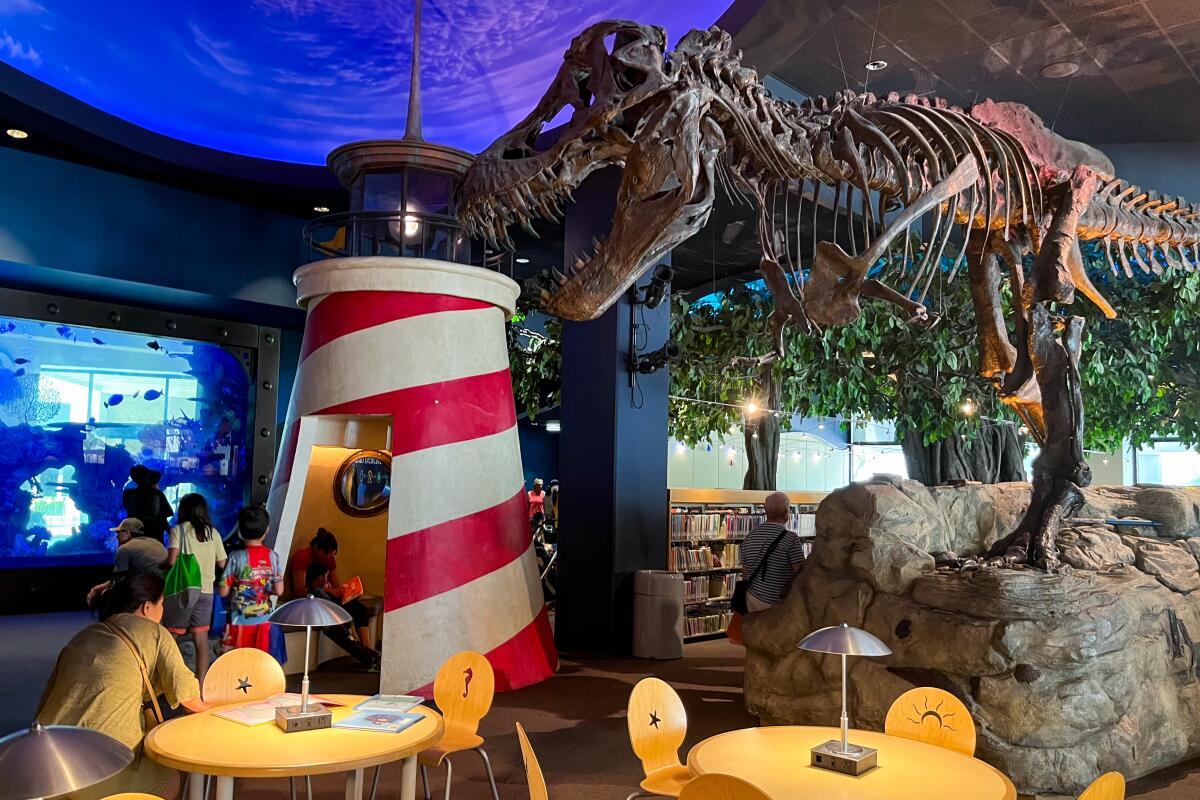
Find so much more than books in the Cerritos Library children's section
Oh, and there are books too. Thousands of them in the children’s area. Need a few recommendations? Visit the reference desk simply called “Help” and a friendly librarian can help lead your kid to their next page turner.
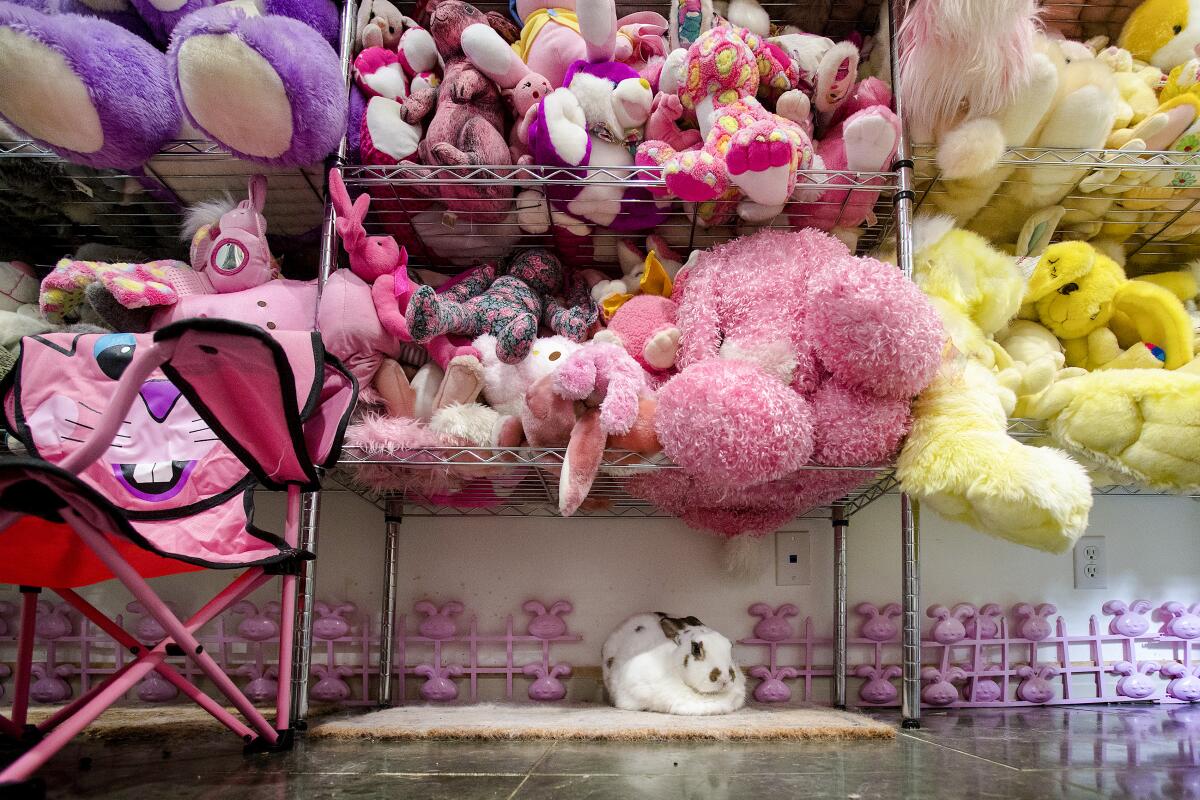
Search for fluffy-tailed friends at the Bunny Museum in Altadena
As you peruse the collections, your brain will be filled with all sorts of facts about the fluffy-tailed animal: Did you know bunnies are a symbol of fertility? Or that there was a dance that originated at San Francisco’s Fairmont Hotel in 1911 called the Bunny Hug? There are bunny greeting cards, displays of bunny watches and so many plush bunnies. In the holiday room, you’ll find Rose Parade float bunnies, a Chamber of Hop Horrors (recommended for those 13 and up) and White House Easter eggs. Note that while children are surely welcome to hop on over to the cozy destination, the owners emphasize that this is a museum and not a petting zoo. Little ones inclined to touch the collections or cuddle the two resident rabbits should wait until they’re a bit older to visit.
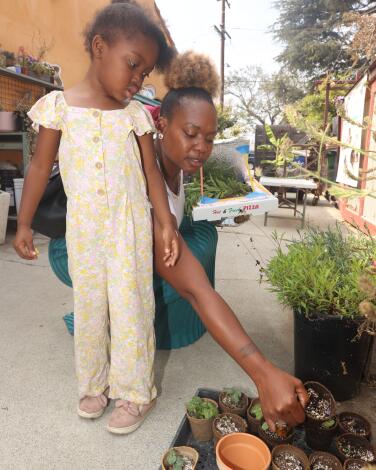
Discover what it takes to run a farm at Moonwater Farm
After a 25-year career in the print and packaging business, Kathleen Blakistone and her partner, Richard Draut — both of whom are master gardeners — used their retirement savings to start their second career as urban farmers in 2011. They initially bought their Compton property, roughly half an acre, to launch an aquaponics farm business but decided to instead transform the space into a community farm where they could teach others about farming, raising livestock, sustainability and how to grow and preserve their food.
Located in the historic Richland Farms neighborhood, Moonwater Farm hosts field trips, workshops and a farm camp for kids ages 9 to 14.
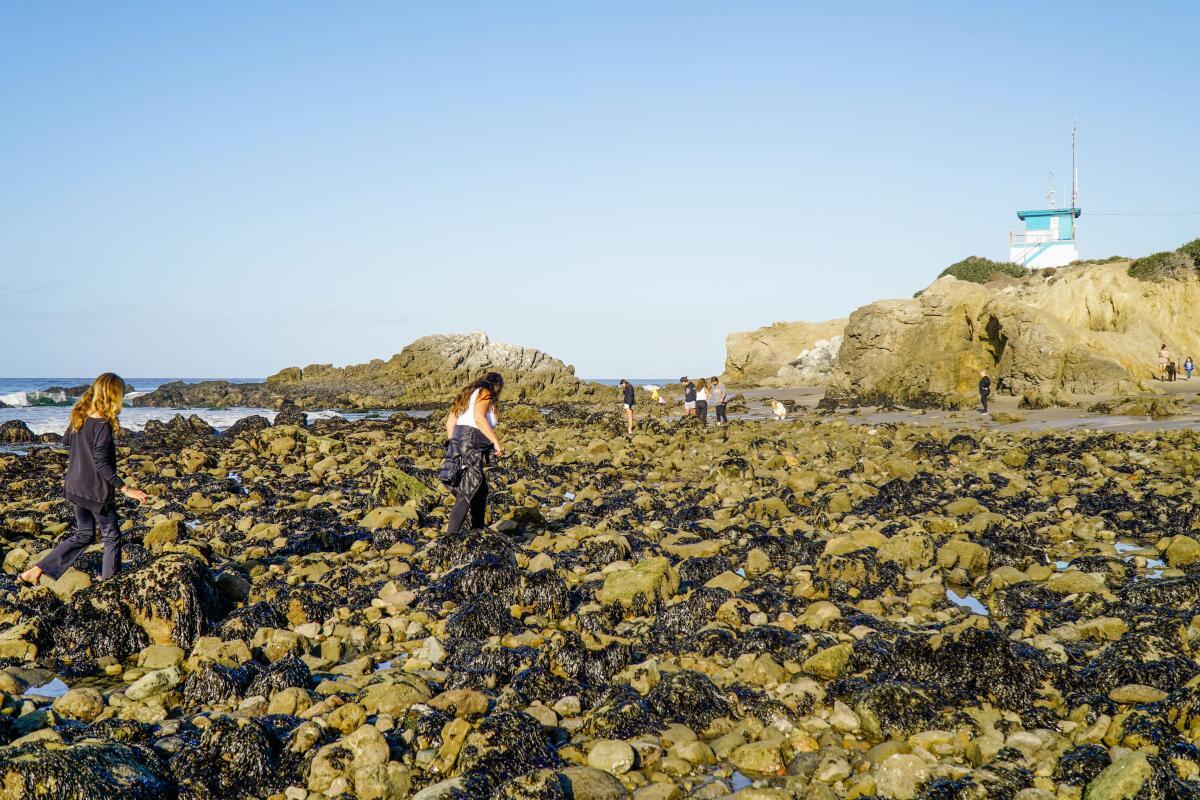
Explore magical sea life at Leo Carrillo State Beach
At Leo Carrillo, there are surprises in each direction. Majestic sea caves. Rocky crags. Views of the Channel Islands. Every now and then, you can gaze toward the sky to find flocks of pelicans flying in formation close to shore.
The tide pools are made up of hundreds of small, pewter-colored boulders. As the waves come in, water gets trapped between the rocks, allowing for optimal sea life viewing. Here you can see mussels, crabs and barnacles but also starfish, cowrie snails and California spiny lobsters.
Before heading out, check the tides and arrive about an hour before the lowest tide. That way you have time to wander without worrying about the rising water. You can also download an app like Tide Alert (NOAA) and set up alerts for low-tide events every day.
Make sure to wear sturdy shoes — the rocks can be simultaneously sharp and slippery. And remember to look but not touch, and definitely don’t remove any of the sea life you find in the tide pools. That threatens the sensitive ecosystem and is strictly prohibited.

Weather a flood of imagination at the Skirball's Noah's Ark exhibit
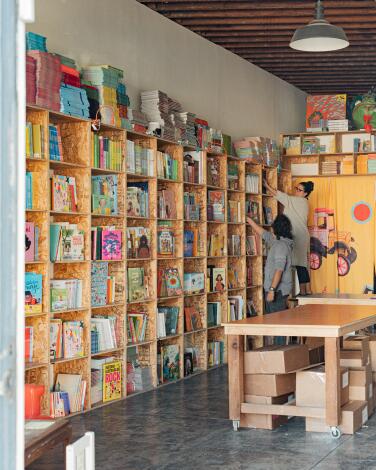
Browse the shelves — and expand your knowledge of the Spanish language — at La Librería
The store’s catalog, thousands of books strong, features imported books from Latin American and Spanish publishing houses. The store’s mission is to help libraries, school districts and individual schools across the country beef up their Spanish-language book collections to make them more accessible to kids. “The majority of our business right now is supplying bilingual and Spanish books to dual immersion programs across the country,” said employee Maria Guerra.
La Librería’s shelves are stacked with pre-K through 12th-grade level books for children and young adults along with YA classics and contemporary stories by authors such as Gilles Barraqué and Amaia Arrazola. “The high-quality editions in our catalog reflect the rich culture and history [as well as] the ethnic and linguistic diversity of Spanish-speaking countries and communities,” reads the store’s website.
“I studied Chicano studies at UCLA, so I know the history of Spanish being prohibited as a functioning language in the U.S.,” said Guerra. “For me, this is a big part of reclaiming Spanish and promoting its value.”
The store also hosts cultural events with writers, artists and musicians and partners with organizations aligned with promoting Spanish literacy in America.
On weekends, don’t expect to find a quiet corner to curl up with a book; the store serves mostly families. “The store does cater to younger audiences,” said Guerra. “But we’re also seeing a lot of young adults and a lot of people who are reclaiming Spanish as a heritage language.”
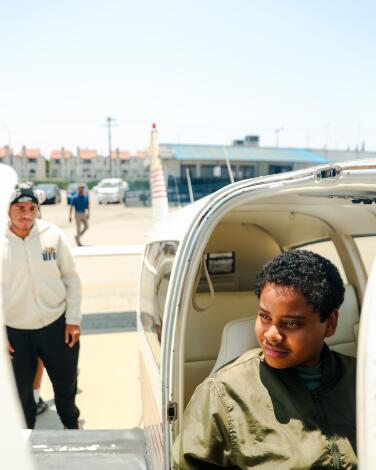
Learn to fly a plane at Compton/Woodley Airport
Today, the Compton/Woodley Airport is home to 200 aircraft, an aviation museum (temporarily closed) and several aviation-related businesses. It’s also the destination where people as young as 8 years old can learn to fly a plane with the Fly Compton Foundation.
The foundation was founded in 2020 by a group of Black professional pilots and aircraft mechanics who wanted to expose kids, especially Black and brown youth in Compton, to the world of aviation.
Fly Compton has a yearly training program to teach kids ages 8 to 18 how to fly an aircraft and eventually get their private pilot license. The classes, which run from September to May, include weekly instruction — there is one fly day per month — and virtual classes every Saturday. It costs $125 per year (plus $25 per month) for kids ages 8 to 12 and $200 (plus $50 per month) for those ages 13 to 17. The foundation also offers an eight-week private pilot summer camp, which is free for selected students as it’s funded by private and corporate donations.
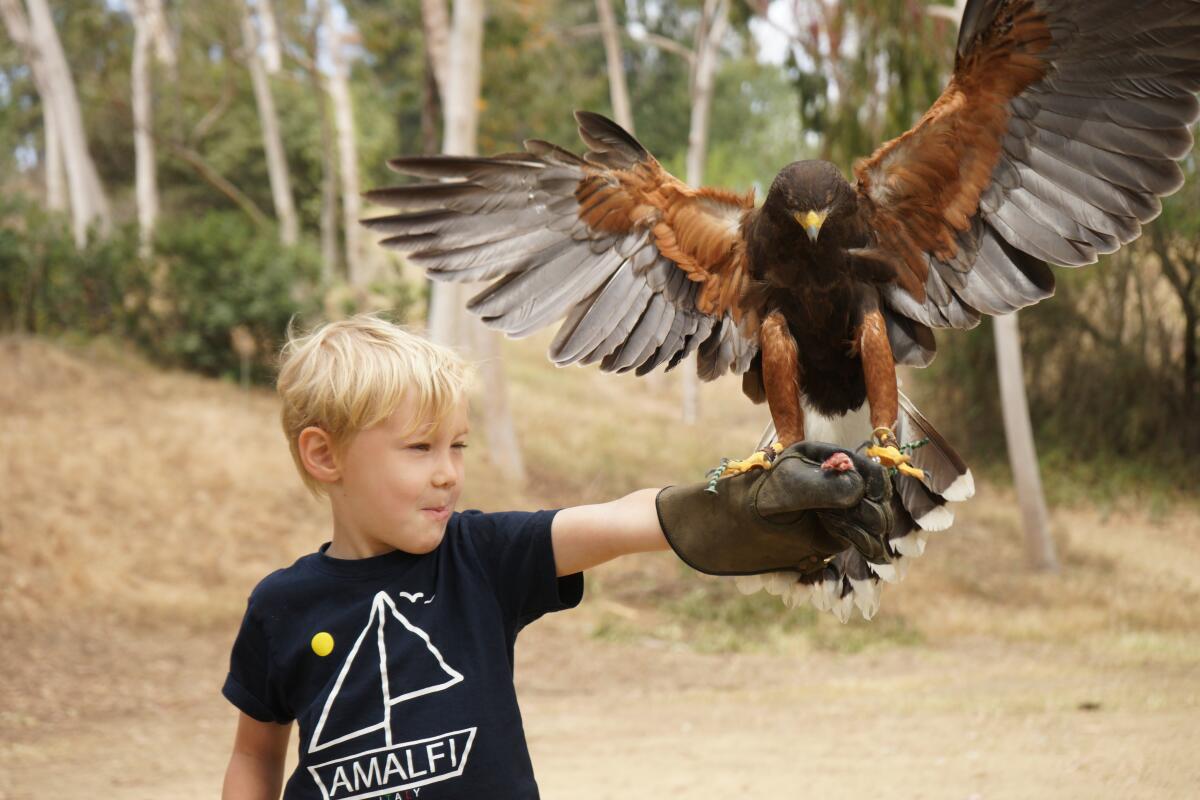
Watch a hawk fly though the air and land on your arm with Hawk on Hand Falconry
“All that matters to them is food,” Baz told a guest one recent afternoon. “They don’t love me.” But they’re fascinating creatures, and Baz (who has a master’s degree in ornithology) can tell you all about their species, habits, lifespans and personal histories. The cost for experiencing multiple birds, along with a pettable barn owl named Archie and an Augur buzzard named Kanoni (“an African cousin of the red-tailed hawk,” Baz said), is $400 for a group of up to four.
When Baz isn’t showing off the birds to curious customers, he and his birds are often hired by TV and movie productions to keep pigeons away or protect drones from seagulls.

Enter an eye-popping art universe at the Mosaic Tile House
Nearly every surface is a riot of color and texture, both inside and outside the house. Kids will especially appreciate the jaunty panda, iguana and “giraffe-a-roo” sculptures out front, and the Alice in Wonderland tableaux on the side walkway. There simply isn’t an inch of this property lacking in whimsy.
While you can certainly appreciate the Mosaic Tile House as an over-the-top visual spectacle, there’s also a sweet lesson here about how art can change our lives. Cheri and Gonzalo fell in love while constructing her studio at the house, and 30 years later, they still live and work here. In addition to their handiwork on the house itself, you can see her large-scale paintings hanging on the studio walls, and his kooky automatons and metalwork in a second studio out back. You’ll likely see one or both of them when you visit. It is their home, after all, albeit a home unlike any other you’ll encounter in L.A.
To visit the house, email [email protected] for reservations.
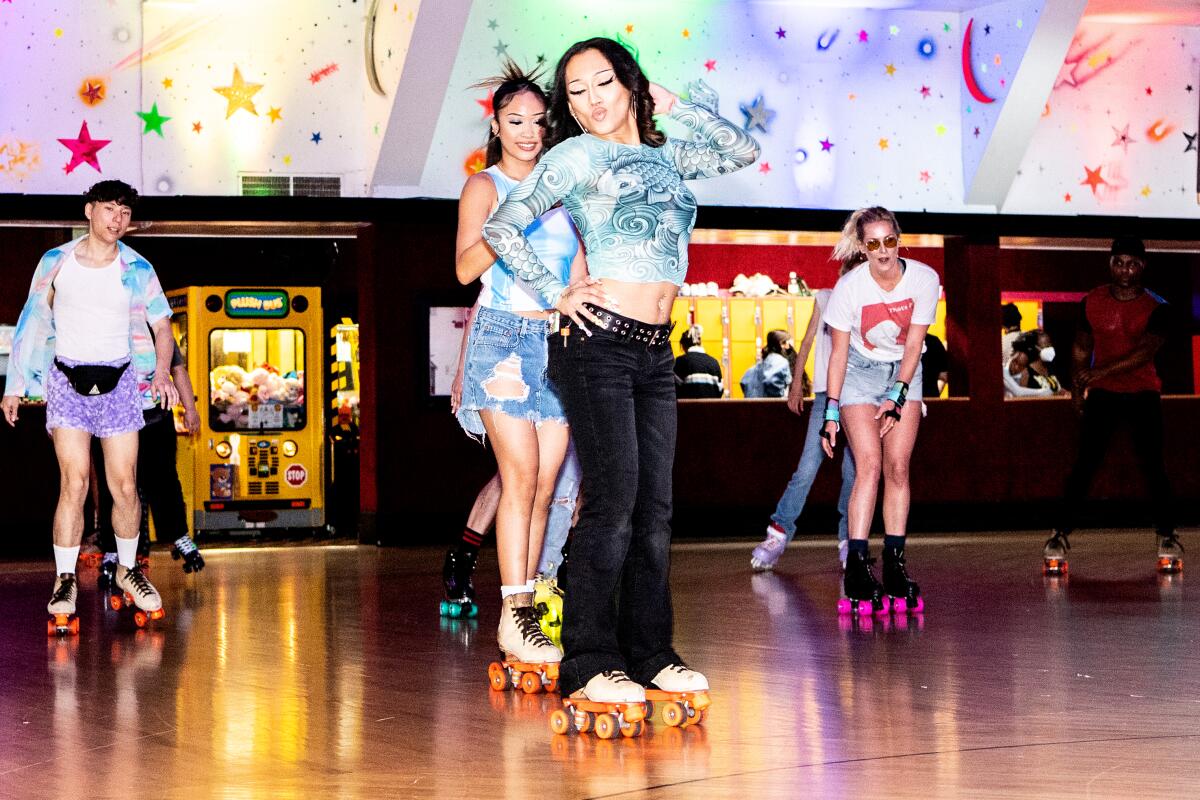
Lace up your skates and find a groove at Moonlight Rollerway
If you want to introduce your kids to that decade on wheels, the perfect place to do it is at the Moonlight Rollerway. Knowing that the key to a successful skating experience is the music, the Glendale rink hosts themed nights featuring tunes mostly from the ’70s, ’80s and ’90s. Wednesday night is Rainbow Skate, a weekly LGBTQ event.
All the interior details — the candy-colored lights, the geometric-print rug and the mirrored ball hovering over the rink — will take you back to that totally rad era. After a good skate, make a trip to the snack bar and order up a corn dog and nachos. Just try to avoid getting any of the cheese on those new satin shorts of yours.

Learn about the real West at Autry Museum of the American West
For the youngest museum-goers, there’s family play space where they can build a barn, pretend-shop with a grocery cart, play with trains, do some crafts, assemble a marble track and read a book from the library underneath the grapevine.

Pet a sweet old goat at Montebello Barnyard Zoo
With its handmade wood signs and small scale, the Montebello Barnyard Zoo is a sweet, homespun place. And it feels all the better to visit knowing that most of these animals were rescued or donated; many are living out their retirement years here. It’s a great place for young ones to learn that animals outside the home need and deserve the same kind of care that we show our pets.
If you’re feeling fancy, you can ride a pony or take a leisurely trip on a John Deere tractor train. But we know the real draw here. It’s the animals, braying and neighing and mooing and maa-ing their friendly hellos as you walk by.

Enter the age of dinosaurs at the Natural History Museum of Los Angeles County
I’ve spent many a weekend at the Natural History Museum — full disclosure, I occasionally volunteer at the space — and each visit I learn something new, be it a glimpse at how ancient fish such as a coelacanth once lived or tidbits about how a saber-toothed cat may have hunted. I’ve also stood, transfixed, near a display dedicated to P-22, the famous late mountain lion of Griffith Park, and watched a projection of a Los Angeles freeway that shows us just how perilous life can be for our wildlife companions.
But I always spend some time with the dinosaurs. The Natural History Museum’s Dinosaur Hall is a place of amazement, where one can ponder the gargantuan skull of a Triceratops, or come face to face with an oddity like the mosasaur, a sea creature. Each stroll through the exhibit space is filled with both childlike wonder and factoids about how our planet evolved.

Watch airplanes fly by while running freely at the Proud Bird
The indoor bazaar offers Bludso’s BBQ and a selection of pizzas, burgers, Asian food, salads and chicken and waffles. There’s a kids menu with smaller portions of what’s on offer for adults, including cheese pizza, fried rice and BBQ brisket. Order at the bar or at a kiosk by Bludso’s and you’ll get a text to pick up your food once it’s ready.
While you wait, grab your drink and score a table out back by the two-story play structure. Beyond that is a gigantic yard full of WWII aircraft to admire. There’s even a Little Free Library by the door if your kid is more of a bookworm than a wiggle worm.
Planes arriving at LAX fly close overhead, awing children and leaving only a modest whiff of jet fuel behind. There’s also ample seating indoors, along with some interesting exhibits about aerospace history in Southern California. This is the ideal spot to kick back with a drink with friends while your kids run around between bites of food.

Solve puzzles and uncover magic in kid-friendly escape room 'The Fun House'
“This is exactly what kids want — an immersive, themed experience where they can go wild and touch everything and explore,” Rhoades says.
After entering via a giant clown — don’t worry, clown-phobics, there are no clowns or scares in the actual room — groups find themselves in a space where paintings come alive and talk to you and all sorts of nooks, crannies and doors are there for exploration. Expect in this magic-themed room to uncover some illusions — winning “The Fun House” means you’ve graduated to becoming a successful magician.
Cross Roads features two versions of the game, one for adults and one geared more for kids, with the recommended age being 8 and older (an adult must be present if anyone under the age of 13 is participating). The “kids” edition simply means puzzles may contain a few less steps to being solved. But Rhoades is quick to point out that sometimes the little ones are better puzzle solvers anyway.
“The Fun House” runs most Wednesdays through Sundays and requires a minimum of three players, with a price of $42 per person.

Restock on ‘Mammoth Chunks’ at the Time Travel Mart
The small market, designed like a convenience store, is animated by conversations between visitors slowly studying the details of the items up for sale, which include a steel wool scouring pad deemed a “robot toupee,” a hand-cranked music box billed as a “Victorian iPod” and a create-your-own T. rex head. “Which is funnier,” you might overhear, “this bottle of robot milk or the Dark Ages Breath Ruiner spray?” Whatever choice they make is ultimately for the greater good: All proceeds go toward operating 826, which publishes stories by students that are available for purchase in the freezer aisle.

Pull giant levers and adopt a caterpillar at the very hands-on Kidspace Children's Museum
At Kidspace, each season is anchored by a whimsical celebration: Winter Frolic, happening now, features a no-ice sock skating rink. In the summertime, there’s Kidspace Campout, complete with campfire songs and lessons about native wildlife. And in spring, it’s Butterfly Season, a popular time at the museum when kids can adopt a live caterpillar.

Putt-putt-putter down the 605 to Golf N' Stuff
Opened in 1971 in Norwalk, the small chain with locations in Ventura and Tucson, Ariz., has seen major updates but retains its classic vintage feel. Pose for a photo by the iconic tree house or in front of the kitschy Big Ben-esque clock tower, or go for a birdie by the giant shoe. On a hot day, heading inside the arcade can provide hours of button mashing on Donkey Kong, Galaga, Mario Bros., Jurassic Park, Halo and pinball. Meanwhile, younger kids will gravitate toward simpler carnival games like the milk jug toss and bean bag toss.
Parents should bring hair ties for kids’ long hair and know that several attractions have height requirements, and some don’t allow open-toe shoes, Croc-style shoes, flip-flops, high heels or sandals. Prices can add up per attraction, so check the website for coupons.
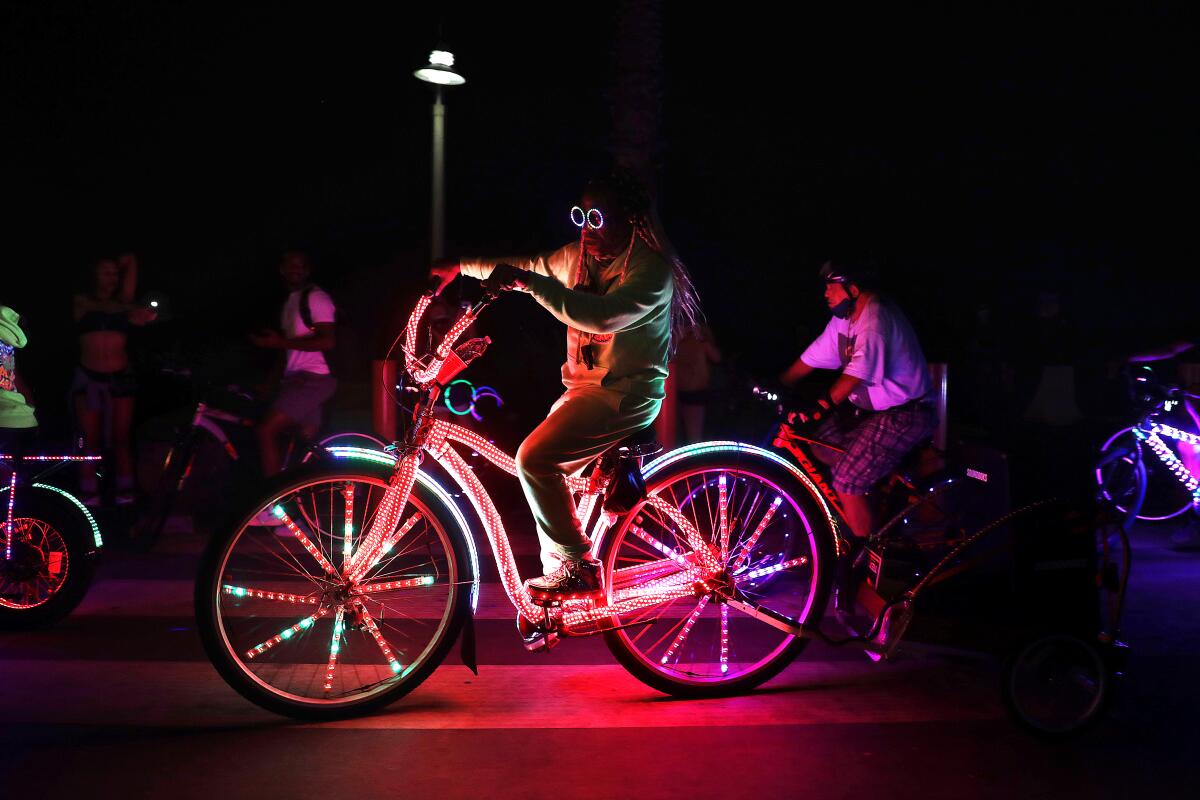
Roll bright with Venice Electric Light Parade
To join in the festivities, which take place every Sunday (unless it’s raining), all you need to do is join the folks who begin to gather at Windward Plaza an hour before sunset and start rolling at dusk. It’s free to participate.
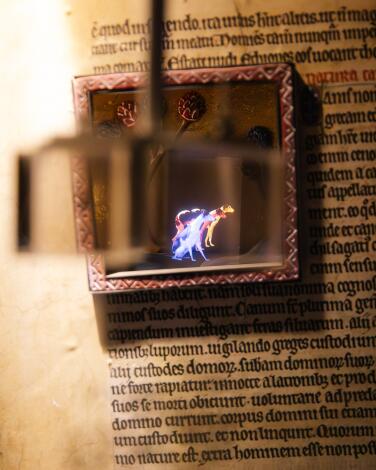
Be mystified at the Museum of Jurassic Technology
Still reading? That curiosity will serve you well on your visit.
A few caveats: Parts of the museum are dark and narrow, and there is no elevator to the second floor, so people with limited mobility may not be able to get the full experience. (The museum discounts tickets for people with disabilities to account for this.) Though nothing is expressly inappropriate for children, younger or more sensitive kids might not enjoy themselves — if they’d be freaked out by a taxidermied mouse, skip. There’s a surprise on the roof.
General admission is $12 and must be reserved ahead of time. Tickets for children 12 and younger are free; $10 for students, educators, seniors and unemployed people; and $3 for people with disabilities and active-duty military. Masks are still recommended inside the museum. Open Thursdays and Fridays from 2 to 8 p.m. and Saturdays and Sundays from noon to 6 p.m.
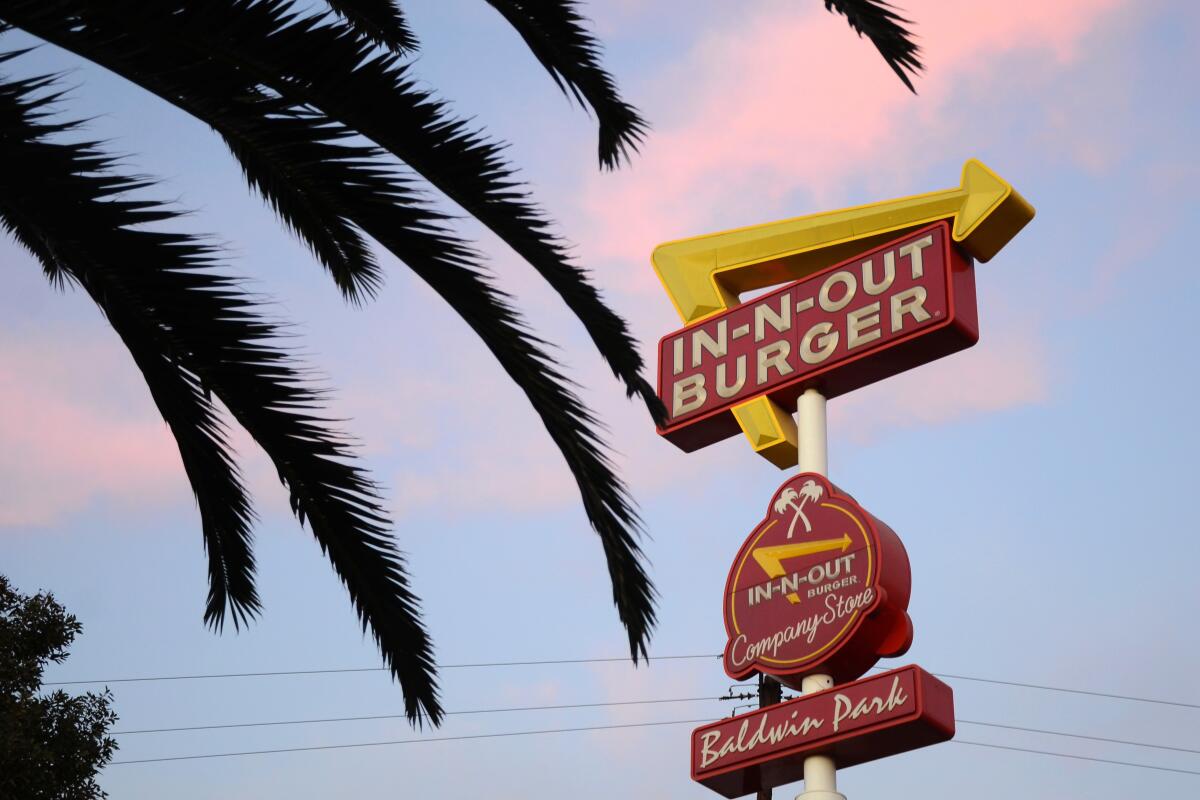
Journey to the beefy center of the In-N-Out Burger universe
If anyone is selfie-hungry, you can head to the nearby replica of the chain’s first tiny, red-and-white burger shack, open for photo ops from 11 a.m. to 2 p.m. Thursday through Sunday at 13752 Francisquito Ave. in Baldwin Park.
Harry and Esther Snyder opened the first In-N-Out burger shack in 1948, which put them among the first to try a drive-thru restaurant. To taste what the fuss is all about, order a “double-double, animal-style” — a double cheeseburger with the works, basically — which has fueled the company’s growth to more than 400 outlets in eight Western states.

Make 3D art, podcasts, short films and more at Octavia Lab at Central Library
First, learn the basics of Tinkercad, a free, 3D design tool that’s browser-based, and prepare the design at home. Then, sign up with a Los Angeles Public Library card, fill out a membership form to use the space and make a reservation beforehand (phone or in-person only) to use the facilities. Younger kids should be supervised by adults, while ages 12 and above can work independently on projects that include visual art, podcasts, music, film, sewing and embroidery, and archivism and storytelling. Software available spans a wide range, including GarageBand, Ableton, LogicPro and Adobe. While there, I spied LAPL artist-in-residence Andy Crocker and her daughter printing a vinyl cat sticker her daughter designed on Photoshop, using a large Octavia lab printer (you supply the vinyl, file and transfer tape). You and your kids can even tackle a family preservation project of converting old home videos or VHS tapes into modern file formats easily viewable by future generations. Low-cost parking is available at the 524 S. Flower St. Garage (get your validation at the Info desk on the main floor).
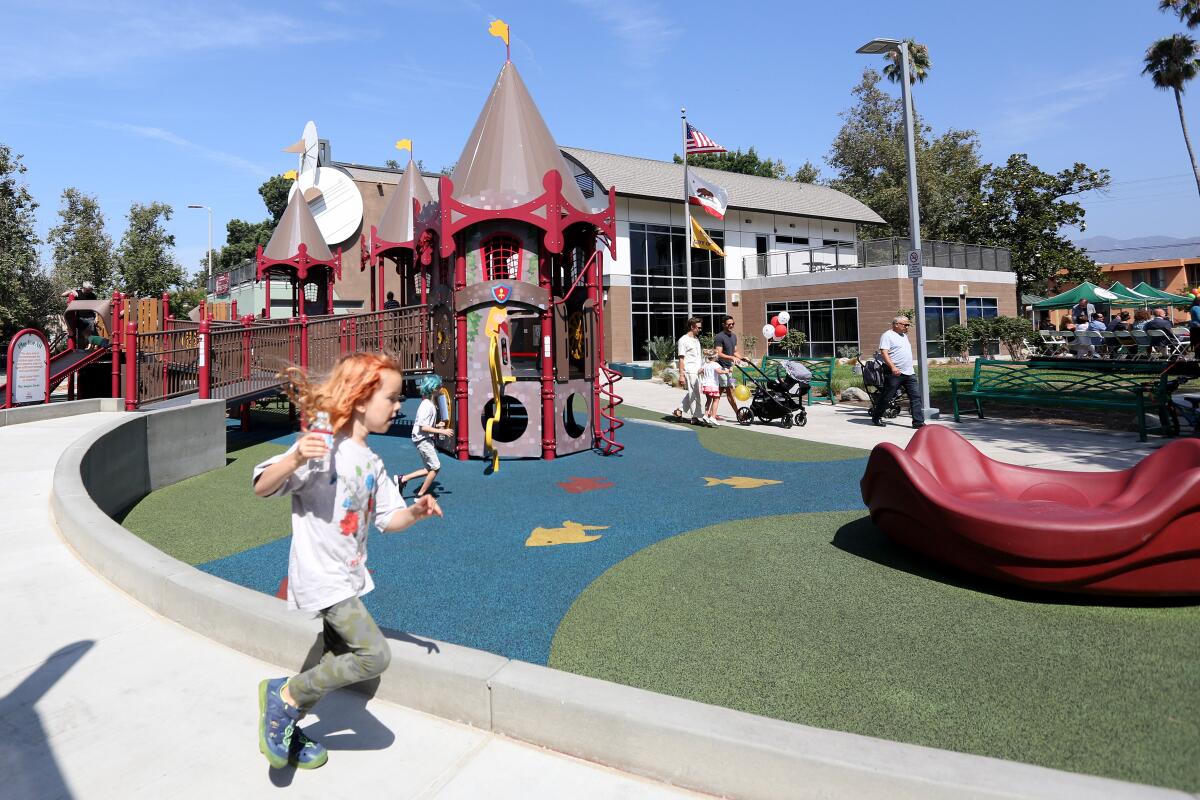
Play alongside children of all abilities at Shane's Inspiration in Maple Park
The first Shane’s Inspiration playground was created by Catherine Curry-Williams and Scott Williams over 20 years ago to honor their son, Shane Alexander Williams, who died of spinal muscular atrophy at just 2 weeks old. Since then, more than 70 of the accessible playgrounds have opened worldwide. The original playground is still bustling with activity and happy kids in the heart of Griffith Park, just a few miles from the Glendale location.

Get eggy with it at Gudetama Cafe
Character statues can be found hanging from the ceiling and on display tables. The walls are awash with murals of Gudetama listlessly saying, “Meh,” “Whatever … ” and “Can I go now?” Nine-year-old visitor Olivia Lopez told The Times that Gudetama reminds her of her mom, Cynthia “Cyn” Lopez. The duo wore matching “Gude vibes” shirts and drove down from the San Fernando Valley to try the new restaurant when it opened earlier this year. A self-described Sanrio fan since her childhood, content creator Lopez said she jumped at the chance to see the cafe and “share this passion of loving Sanrio” with her daughter.

Take in the sights (and smells) of the La Brea Tar Pits and Museum
Outside around the pits and Hancock Park (the park, not the neighborhood), children can get in some running and screaming time while admiring the climbable Ice Age mammal sculptures. Adults (or precocious kids) can savor the Pleistocene Garden, with its plantings representing the Los Angeles Basin’s native vegetation 10,000 to 40,000 years ago.

Visit Walt’s Barn, where Walt Disney tinkered with trains and dreamed up ideas
Disney was a train fanatic. So much so that in 1950, five years before Disneyland opened, he built a ⅛-scale steam railroad behind his Holmby Hills mansion. The Carolwood Pacific Railroad puffed along on a half-mile track, including a tunnel beneath wife Lillian’s flower garden. At the center of it all was the barn, where Walt controlled the track switches.
In 1999 the Disneys moved the barn to Griffith Park, where it now sits on the grounds of the Los Angeles Live Steamers Railroad Museum. While kiddos looking for Moana and Elsa tie-ins may be disappointed, the barn is filled with all sorts of unique memorabilia from Disney and his animators who shared his train obsession. You’ll see Walt’s work tools, the wash basin he used to prep for meetings, that kind of thing. Outside there’s a yellow passenger car that was in operation on Disneyland’s opening day in 1955.
Once you’ve gotten your fill of the Disneyana, take a ride on one of the miniature trains run by the Los Angeles Live Steamers Railroad Museum.

Explore a kid-sized secret world inside The Huntington
Here, brilliant landscaping and art design encourage kids to learn about the natural world as they romp. They’ll feel the pull of Earth’s core as magnetic sand runs through their fingers, and marvel at how sunlight refracts into different colors inside a rainbow tunnel. The Dr. Seussian plants and animal-shaped topiary are a big part of the experience too — this is a botanical garden, after all. The garden is impossible for kids not to love. You’ll know from the “wow” expressions on their faces when they first see it, and how unwilling they are to leave.
With all the enticing water features, consider packing a change of clothes for little ones or maybe even putting them in a bathing suit. It’s also worth checking the website before you go for any special family programs. Weekends are generally crowded, but weekday afternoons can be surprisingly quiet.
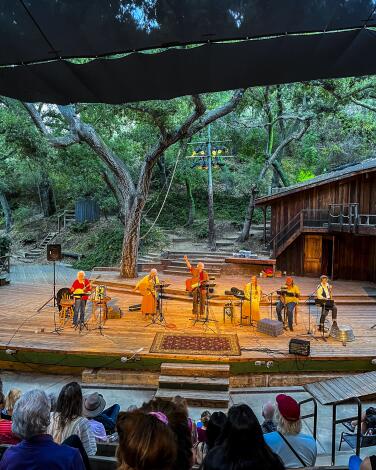
Learn a Shakespeare monologue at the storied Will Geer Theatricum Botanicum
Given its founder and its early days as an artists commune, the Theatricum Botanicum is heavily community-minded, hosting fundraisers, educational workshops, youth classes and the Shakespeare-themed “pay what you Will” nights. The theater also honors its founder’s friendship with and legacy of folk hero Woody Guthrie, who for a time lived on the premises; the team is working to build the Shelter, a Guthrie and Geer archive on-site. Geer’s daughter Ellen serves as the artistic director, and his granddaughter Willow participates in acting and directing, keeping the family’s legacy alive and thriving in the canyon.
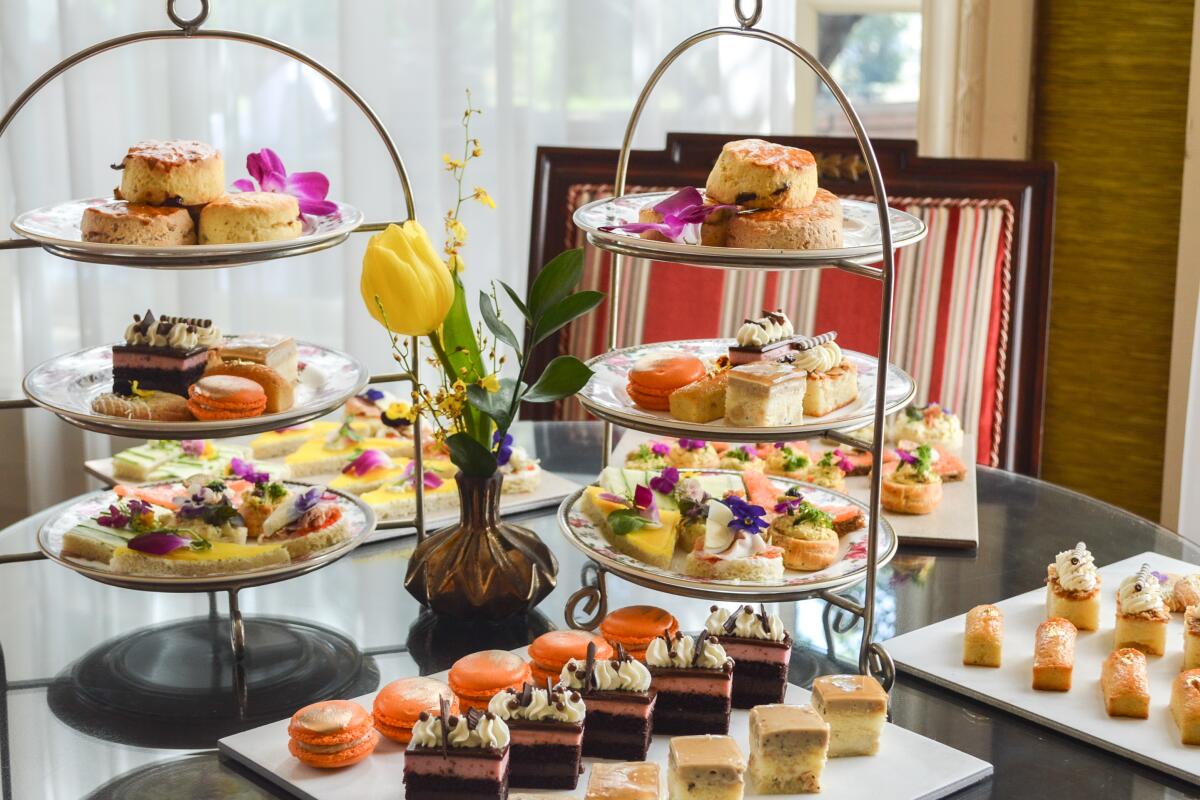
Go pinkies up at the Langham Huntington for fancy afternoon tea
During the holidays, there’s “teddy bear tea” ($90 per person) complete with special treats, a visit from Santa, a puppet show and a Paddington Bear teatime friend to take home.

Read to an adoptable pet at Wallis Annenberg PetSpace
Kids are welcome to bring in a book and work with one of the team members to read to an adoptable pet. Every Saturday at 11:30 a.m., they can join a free Paws & Pages story time event where they’ll hear an animal-themed tale, do a craft and meet a critter. Other community events include Puppy Bowl, dog-friendly comedy shows and a fur-ociously fun cat art show (one piece from this year’s show, “Kobe Entering the Kingdom of Kittens” by Britt Ehringer, depicts Kobe Bryant ascending into feline heaven and it is extraordinary). Activities at Wallis Annenberg PetSpace change daily, so check the calendar for the latest. And who knows? You may just meet an adoptable pet there and find yourself totally smitten. If you’re suddenly signing papers to bring home a new family member, don’t say we didn’t warn you.

Ride through L.A.’s rich railroad heritage at Travel Town in Griffith Park
The museum hosts interesting exhibits such as “The Trains Must Be Fed,” which focuses on Fredrick Harvey, a 19th century American innovator who created restaurants, hotels and souvenir shops for railroad travelers in the western United States. Kids will get a kick out of the prices back in the day — an entire breakfast cost 75 cents, for instance — though grown-ups may just shake their heads solemnly.
Follow the tracks to the Travel Town Museum Store to grab cold drinks and snacks for the kids, and to shop for souvenirs like miniature train sets, books and games. You’ll be glad to know that your purchases support the foundation’s train restoration projects and other educational programs at the site.

Get up close and personal with exotic animals at STAR Eco Station
It is a bit more modest than a traditional zoo: Some of the animals are in the same types of plastic tanks and metal cages your pets live in at home. It lends a charmingly cozy feel to getting up close and personal with a hairy tarantula.

See a Disney film with a stage show at El Capitan Theatre
Stage shows feature characters from the films, interactive DJs, dance parties and trivia contests with prizes. The theater also offers sensory inclusive screenings with dimmed lights and lower sound, reduced capacity and sensory activity bags (available upon request). And of course, snacks are a must. Pick up an El Capitan popcorn bucket and Mickey pretzel at the concession stand, or promise your kids you’ll pop next door to the Ghirardelli Soda Fountain & Chocolate Shop for a sundae after the show.

Geek out with amateur astronomers at a star party at Griffith Observatory
Lines for each telescope can get long, and are cut off to end viewing by 9:45 p.m. Restrooms and changing tables are in the parking lot, within the Observatory on the Historic level and in the lower levels of the building (the Edge of Space and the Gunther Depths of Space sections). Parking can be challenging if the Greek Theatre’s lot is full, but check out street parking on West Observatory Road on the way up, or at the top parking lot — or opt for a rideshare or take LADOT’s DASH bus.
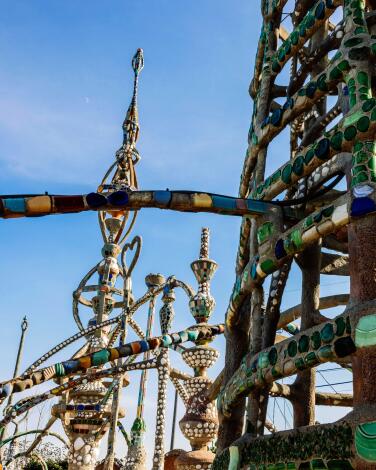
Learn what keeps the Watts Towers upright
Sabato (Simon) Rodia, a wiry immigrant from Italy, not quite 5 feet tall, started this backyard project in 1921 and spent 33 years putting up Watts Towers (up to 99 feet high), using rebar, concrete, cast-off tiles, bottle caps and bits of colored glass. (Weirdly, Italian immigrant Baldassare Forestiere was doing something similar in Fresno through most of those years, but working his way down, not up.)
Rodia walked away from his project in 1954 and died in 1965. For decades, arts advocates and government officials tangled over the city’s sometimes corrupt and incompetent maintenance of the landmark. Yet his towers survived, credited as inspirations by local heroes including artist Betye Saar and jazz great Charles Mingus.
The triangular property is now a state historic park and community arts center, and after years of restoration, the scaffolding is down. The area inside the property’s walls is open for guided tours (about 30 minutes, $7 per adult) on Thursday and Friday, but the window of availability is small: 11 a.m. to 12:30 p.m. and 1:30 to 3 p.m. You can also bring your kid’s entire class to the towers for a guided tour, documentary viewing and artist-led activity by contacting the education coordinator.

Get lost in a sea of crochet plushies at Crochet Art Studio
Cruz, who has been crocheting all her life since her aunt taught her as a child, decided to turn her hobby into a business at the urging of friends and family. “My sister and I were the type of people who don’t really give elaborate gifts,” Cruz said. “So I crocheted her a scarf, and then I made her some earmuffs, and that’s all I was going to do.” Soon came the plushies, which she has been selling through her popular website. A fun gift idea? You can DM her a photo at @crochetartstudio_ on Instagram and Cruz can create a custom plushie. She made one of her friend, actress and comedian Kate Micucci, who is a huge Crochet Art Studio supporter.
In-person shopping at Crochet Art Studio is currently by appointment only. Cruz also offers beginning crochet classes where children (ages 8 and above) and adults can learn the basics and crochet charming creations of their own.
Sign up for The Wild
We’ll help you find the best places to hike, bike and run, as well as the perfect silent spots for meditation and yoga.
You may occasionally receive promotional content from the Los Angeles Times.

